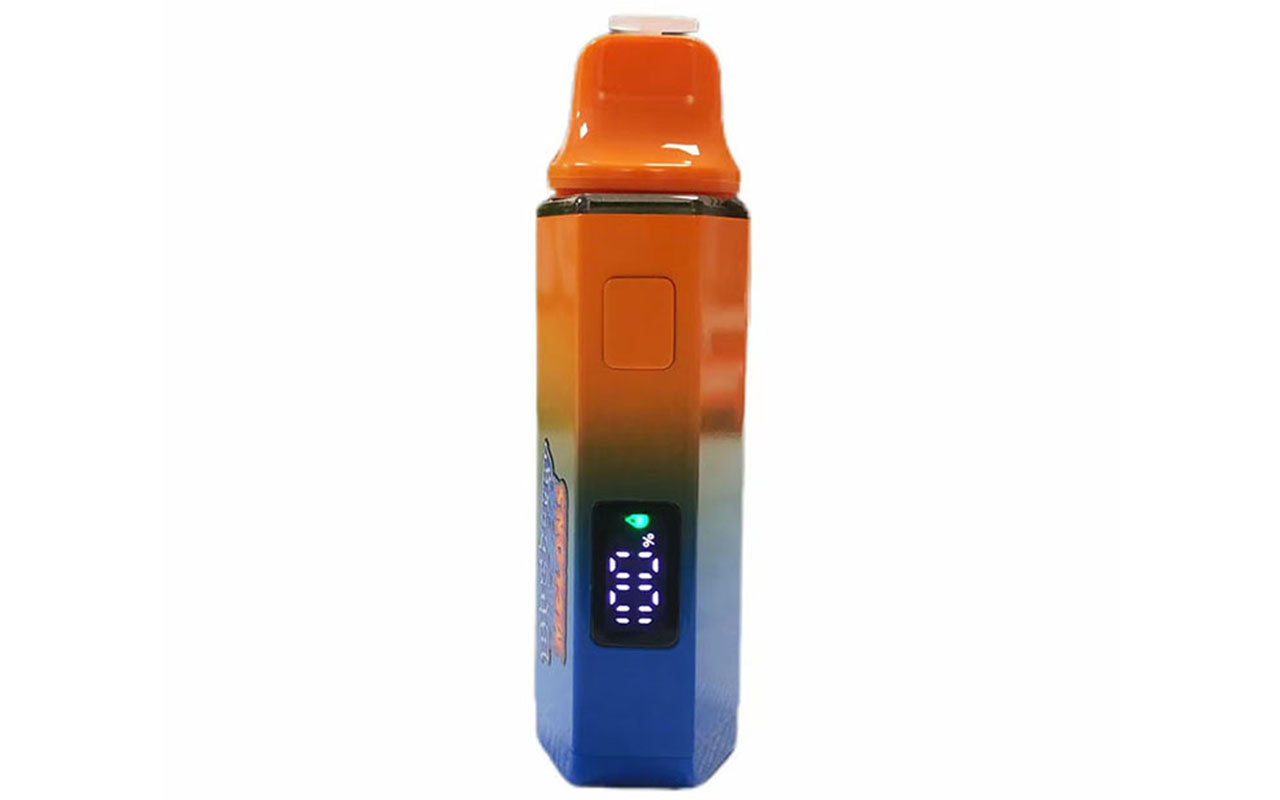Recognizing the Signs of THC Vape Addiction

Are you wondering if THC vapes can lead to addiction? You're not alone. Many people overlook the signs until it's too late. Recognizing addiction early can make a huge difference in your life. THC vaping can affect your mental and physical health, leading to serious consequences. Whether you're a casual user or someone who engages in teen cannabis vaping, understanding these impacts is crucial for your well-being.
Key Takeaways
Notice early signs of THC vape addiction. Look for changes in behavior and needing more to feel the same. Knowing these signs can help you act before it gets worse.
Learn about how THC vaping affects mental health. Many users feel anxious or sad. This can lead to needing it more.
Be aware of the health risks from vaping THC. Long-term use can cause breathing problems and heart issues.
Get help if you see signs of addiction. Professional treatment, therapy, and support groups can help you recover.
Think about the legal and money issues with THC vaping. Knowing local laws and costs can help you make smart choices.
Understanding THC and Its Effects

What is THC?
Tetrahydrocannabinol, or THC, is the main psychoactive compound in cannabis. When you consume THC, it interacts with your brain's receptors, leading to the "high" that many users seek. THC is found in various forms, including oils, edibles, and, of course, vapes. Vaping THC oil has become increasingly popular due to its convenience and perceived safety compared to smoking.
How THC Affects the Brain
When you vape THC, it quickly enters your bloodstream and reaches your brain. This rapid delivery can create intense feelings of euphoria. However, high-potency THC can also lead to negative effects. You might experience anxiety, paranoia, or impaired memory. Over time, frequent use can alter your brain's chemistry, making it harder to feel pleasure without THC. This change can lead to a cycle of dependence, where you find yourself needing more to achieve the same effects.
Differences Between Vaping THC Oil and Other Methods
Vaping THC oil differs from other consumption methods like smoking marijuana or using edibles. Here are some key differences:
Onset Time: Vaping delivers THC to your system almost instantly, while edibles take longer to kick in.
Control Over Dosage: With vaping, you can control how much you inhale, making it easier to manage your intake.
Health Risks: While vaping is often seen as less harmful than smoking, it still carries risks. The long-term effects of vaping cannabis are not fully understood, and some products may contain harmful additives.
Understanding these aspects of THC can help you make informed choices about your use. If you notice changes in your behavior or health, it might be time to reflect on your relationship with vaping.
Signs of THC Vape Addiction
Behavioral Changes
Have you noticed shifts in your behavior since you started vaping THC? Changes can be subtle at first but may become more pronounced over time. You might find yourself prioritizing vaping over other activities you once enjoyed. Maybe you’ve started isolating yourself from friends or family who don’t vape. These behavioral changes can signal a developing addiction.
Tip: Keep an eye on how often you choose to vape instead of engaging in hobbies or socializing. If you find yourself reaching for your vape more frequently, it might be time to reflect.
Increased Tolerance to THC
As you continue to vape THC, you may notice that you need more to achieve the same effects. This is known as increased tolerance. Initially, a small amount of vaping THC oil might give you the desired high. Over time, however, you might find yourself using a dab pen more often or consuming larger doses. This escalation can lead to a cycle of dependence, where you feel you can't enjoy life without higher amounts of THC.
Withdrawal Symptoms of Dependence
If you try to cut back or stop vaping THC, you might experience withdrawal symptoms. These can include irritability, anxiety, and physical and mental cravings for THC. Some people report feeling restless or having trouble sleeping when they stop using. These withdrawal symptoms can make it challenging to quit, reinforcing the cycle of addiction.
Recognizing these signs early can help you take action before your dependence worsens. If you find yourself experiencing any of these symptoms, consider reaching out for support.
Psychological and Physical Symptoms

Mental Health Impacts of THC Vaping
Vaping THC can significantly affect your mental health. Many users report experiencing anxiety and depression after starting cannabis vaping. In fact, studies show that about 70% of those who vape THC-only report anxiety symptoms. Additionally, around 50% of these users experience depression. Some even start vaping to relieve these feelings, thinking it will help. However, this can lead to a cycle of psychological dependency, where you rely on THC to cope with your emotions rather than addressing the root causes.
Here’s a quick look at some mental health issues linked to THC vaping:
Evidence Type | Percentage |
|---|---|
Anxiety Symptoms | 70% (THC-only) |
Depression Symptoms | 50% (THC-only) |
Suicidal Thoughts | >50% (All Vaping Groups) |
Started Vaping for Anxiety Relief | 50% (THC-only) |
Started Vaping for Depression Relief | 50% (THC-only) |
Physical Health Concerns Related to Vaping THC
Physical health issues can also arise from vaping THC. While many believe that vaping is safer than smoking, it still poses risks. You might experience respiratory problems, such as coughing or wheezing. Some users report experiencing increased heart rates and other cardiovascular issues. Long-term effects of vaping THC oil can harm your lungs and overall health.
Social and Lifestyle Changes from Addiction
As your dependence on THC grows, you may notice changes in your social life. You might start avoiding friends or family who don’t vape. This isolation can lead to feelings of loneliness and further exacerbate mental health issues. Your daily activities may revolve around vaping, pushing aside hobbies and interests you once enjoyed. Recognizing these lifestyle changes is crucial. They can signal that your relationship with vaping has shifted from casual use to addiction.
If you find yourself in this situation, it’s essential to seek help. Understanding the psychological and physical symptoms of THC vape addiction can empower you to take action before it’s too late.
Consequences of Addiction
Impact on Daily Life Due to THC Dependence
When you develop a dependence on THC, your daily life can change dramatically. You might find it hard to focus on work or school. Tasks that once seemed easy may feel overwhelming. Relationships with friends and family can suffer as you prioritize vaping over spending time with loved ones. You may even notice that your hobbies take a backseat to your need for THC. This shift can lead to feelings of isolation and sadness, making it crucial to recognize these changes early.
Legal and Financial Ramifications of THC Vaping
Vaping THC can also bring legal and financial troubles. Depending on where you live, cannabis laws vary widely. You could face fines or legal issues if caught with marijuana vapes in areas where they are illegal. Additionally, the cost of regularly purchasing vaping supplies can add up quickly. You might find yourself spending more than you intended, which can strain your finances. This financial burden can lead to stress and anxiety, further complicating your relationship with THC.
Long-term Health Risks Associated with THC Use
Long-term marijuana use, especially through vaping, poses several health risks. Research shows that prolonged exposure to THC can lead to respiratory issues, similar to those caused by smoking. You might also experience cognitive impairments, affecting your memory and decision-making skills. The risks of developing a marijuana addiction increase with frequent use, leading to a cycle of dependency that can be hard to break.
It's essential to consider these consequences seriously. If you notice any signs of addiction, seeking help can prevent further complications in your life.
How to Seek Help
Recognizing the Need for Support in THC Addiction
If you’re starting to notice signs of THC addiction, it’s crucial to recognize that you don’t have to face this alone. Acknowledging your dependence on vaping can be tough, but it’s the first step toward recovery. Ask yourself if you’ve tried to cut back but found it difficult. If so, it might be time to seek support. Remember, reaching out for help shows strength, not weakness.
Professional Treatment Options for THC Dependence
When it comes to treating THC dependence, several professional options are available. Here are a few you might consider:
Therapy: Individual or group therapy can help you understand the root causes of your addiction. Therapists can provide coping strategies to manage cravings.
Detox Programs: These programs offer a structured environment to help you safely withdraw from THC. Medical professionals can monitor your progress and provide support.
Rehabilitation Centers: Inpatient or outpatient rehab can provide comprehensive care. These centers often combine therapy, support groups, and medical assistance.
Finding the right treatment option can make a significant difference in your recovery journey.
Support Groups and Resources for Vaping THC Users
Support groups can be incredibly beneficial for those struggling with THC addiction. Connecting with others who share similar experiences can provide comfort and encouragement. Here are some resources you might explore:
Local Support Groups: Check for local meetings in your area. Organizations like SMART Recovery or Narcotics Anonymous often have groups focused on cannabis use.
Online Forums: Websites and social media platforms host communities where you can share your experiences and gain insights from others.
Hotlines: Many organizations offer hotlines where you can speak with someone trained to help. They can guide you to local resources and support.
Taking the first step to seek help can lead you toward a healthier, more fulfilling life. Don’t hesitate to reach out; support is available.
THC vapes can lead to addiction, and recognizing this is crucial for your well-being. Awareness of the signs helps you intervene early, preventing further complications. If you notice changes in your behavior or health, don’t hesitate to seek help. Support is available, and taking that first step can lead you toward a healthier life. Remember, you’re not alone in this journey.
FAQ
What are the signs of THC vape addiction?
Signs include behavioral changes, increased tolerance, withdrawal symptoms, and neglecting responsibilities. If you find yourself prioritizing vaping over daily activities or relationships, it may indicate a developing addiction.
Can I become addicted to THC vapes even if I use them occasionally?
Yes, even occasional use can lead to dependence. Your brain can adapt to THC, making you crave it more over time. It's essential to monitor your usage and recognize any changes in your behavior.
How can I reduce my THC vape usage?
Start by setting limits on how often you vape. Gradually decrease your intake and find alternative activities to fill your time. Consider seeking support from friends or professionals to help you through the process.
Are there any long-term effects of vaping THC?
Yes, long-term effects can include respiratory issues, cognitive impairments, and increased risk of mental health disorders. Regular use can also lead to addiction, making it harder to quit.
Where can I find support for THC vape addiction?
You can find support through local therapy groups, online forums, or hotlines. Organizations like SMART Recovery and Narcotics Anonymous offer resources and community support for those struggling with addiction.
